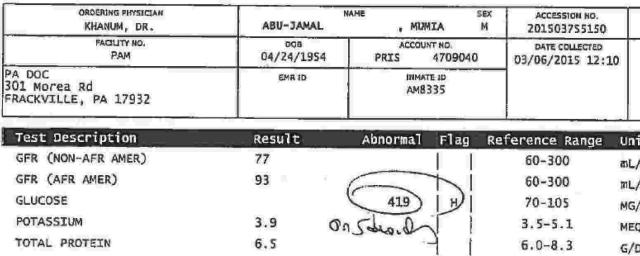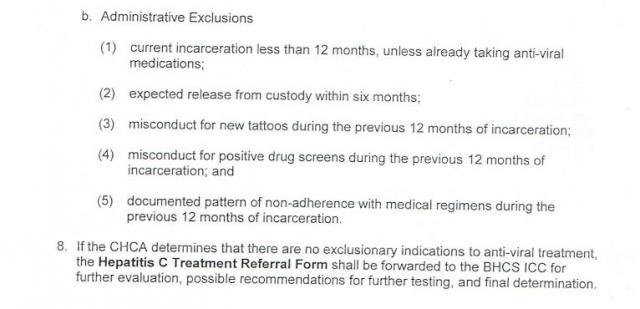This is the final part of a series on Mumia Abu-Jamal’s fight for appropriate health care for himself and for over 2 million prison inmates across the country. (Click here for Part I, here for Part II, or here for Part IIIa)
In Abu-Jamal’s case, most of the legal and media discussion has focused on the denial of hepatitis treatment to him and inmates across the country. And while that alone is malpractice, what is even more appalling was the failure to diagnose and then treat his diabetes. Diabetes care is a cornerstone of basic healthcare. Abu-Jamal’s case illustrates that inmates are denied not only expensive medical treatments but also widely available, inexpensive treatments. Moreover, it demonstrates a failure of correctional healthcare systems to provide even the most basic health care for its patients.
Abu-Jamal, nearly a year ago tested positive for diabetes while imprisoned, and yet his case was intentionally left untreated. In his medical records, blood tests taken on March 8, 2015 showed a glucose level of 419, well exceeding the diabetic level of 200.
There are two major forms of Diabetes. Type 1 Diabetes is the kind that frequently presents young in life. While it is very common for this form of diabetes to be initially diagnosed in a crisis setting (coma, severe dehydration, electrolyte disturbances), Type 2 Diabetes, the form that typically starts in adulthood and the form that Abu-Jamal has, very rarely gets to that point because it develops more slowly and is discovered early before it ever reaches that level of severity.
In his chart, someone circled the blood sugar value and wrote by it “on steroids.” What this note suggests is that the provider felt that since there was an explanation for his high blood sugar, there was no need to treat it. That lack of action is equivalent to looking at a patient whose pneumonia is so severe that they need a breathing machine and then saying, “We know why they’re not breathing well. They have pneumonia.” Just because you know the cause of a finding doesn’t mean it doesn’t have to be treated.
 Lab results from Abu-Jamal's medical record
Lab results from Abu-Jamal's medical record
Standard of care for a blood sugar that high is to immediately give medication to lower it, or at least monitor three times a day. One of the main medications for the treatment of diabetes is metformin. It costs $4 a month. But because prison doctors didn’t provide any treatment, his sugars climbed to levels so toxic that his brain stopped functioning and he went into a diabetic coma.
Countrywide epidemic of neglectful healthcare
Sadly, Abu-Jamal’s healthcare is not an exception. It’s an example of the poor healthcare that is rampant in prisons and jails across the country. Cases of this felonious level of healthcare are so numerous that it would be impossible to list them in their entirety. However a few examples illustrate the severity of the negligence.








